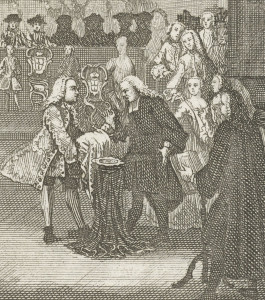In response to the article about the word dopen (baptisms), Tore Langholm asked:
Has “baptism” always/usually been equivalent to “infant baptism” in the Netherlands?
I just found a record of a baptism in the Nederlandse Hervormde Kerk in July of 1698, and wonder if I can assume that this is also the childs’ birth year?

The baptism of William V of Orange, 1748. Image credits: Rijksmuseum
Most children were baptized within days of being born, so the baptism date is a good approximation of the birth date. Before 1811, it is often the earliest record you will find and there will be no record that states the actual birth date.
In Roman-Catholic churches, children were often baptized on the day they were born or the following day, while Dutch Reformed churches usually baptized children the next Sunday. You can use WolframAlpha to find out the weekday by typing in the date. If a Dutch Reformed child is baptized on a different day of the week, it could mean that the child was ailing and was not expected to live. There are some regional differences: in some northern provinces Dutch Reformed children were usually baptized when they were several weeks old.
Not all religions baptized their children as infants. The Doopsgezinden (Anabaptists) believed that people should consciously choose to become a part of the church. In that church, people are only baptized when they are adults, usually around the age of 18.
[edit: added information about regional differences based on the comments]


In the Catholic Church there were also emergency baptism allowed by the midwifes at home in case of a very weak child that wouldn’t make it to church.
gr,
Irma
In the province of Friesland the gap between birth and baptism can be several weeks up to a few months. I suppose that in the very small vilages not every sunday was a service held.
That was certainly the case in some rural Dutch communities in the midwest USA where traveling ministers came for church services and rituals at varying intervals. My grandmother was old enough to talk (she spoke Dutch as her first language) when she was baptized and warned the minister not to get her new lace collar wet.
What a lovely story, thanks for sharing!
Dag Yvette, wat een leuke website! Complimenten.
Maar Doopsgezinden worden in het buitenland meestal Mennonieten genoemd, naar Menno Simons, hun grote voorman.
Anabaptisten is een meer algemene (en oudere naam) voor ieder die zich later wil laten dopen.